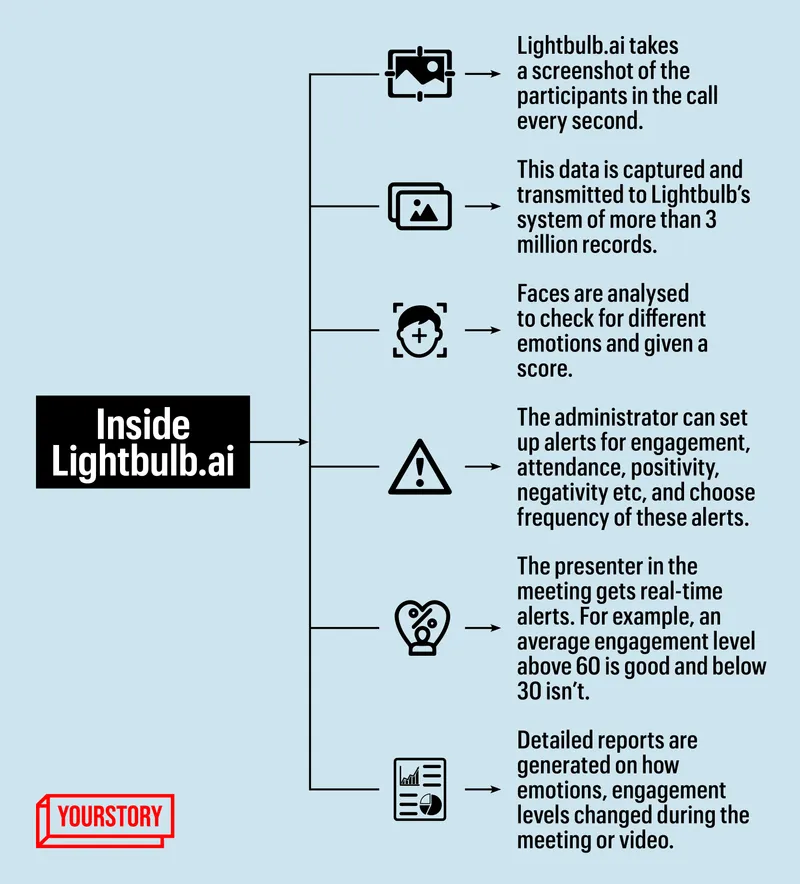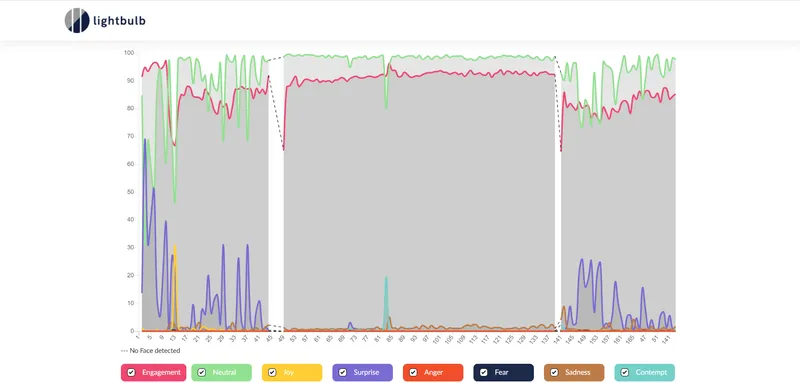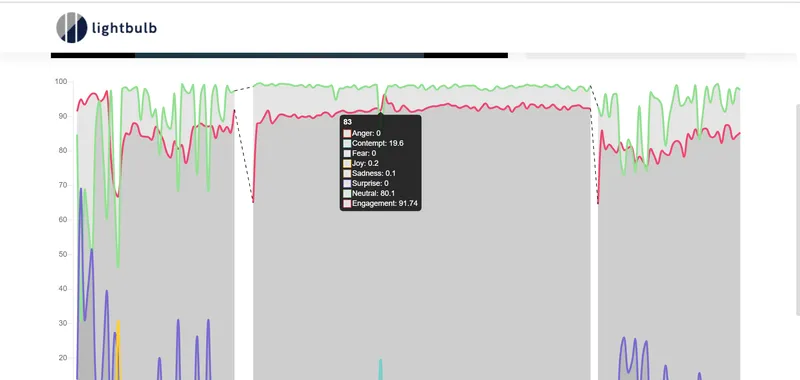A startup leveraging AI/ML to help businesses gauge users’ mood
Founded in 2020 by Ritu Srivastava, Yogesh Sachdeva, and Vishal Soni, Mumbai-based Lightbulb.ai is building a platform to help detect participants' emotions in virtual meetings.
Serial entrepreneur Ritu Srivastava was shocked when she saw how her now-teenage daughter navigated online learning. It made her question the attentiveness, and by extension engagement, of students in these virtual classes.
“Are they learning?” she thought.
“And that's where the entire conversation started from,” Ritu tells YourStory. “When stuff happens in your own life, it gives you an insight into a potential problem.”
Ritu decided to solve this problem by building an emotion detection artificial intelligence (AI) platform that maps emotions in any digital or remote interaction. She partnered with Vishal Soni, who is her husband, and co-founder Yogesh Sachdeva to launch .
Founded in 2020, the startup is the trio's second entrepreneurial stint, having previously built and exited Obino, a digital health and weight-loss coaching startup.
How does Lightbulb.ai work?
Lightbulb.ai uses machine learning (ML) models to detect the emotions of participants in video conferencing or when they are consuming content. These details are shared in real-time with users to evaluate the engagement and interest of participants and the audience in real-time.
The Mumbai-headquartered startup’s technology looks at human faces, and maps the emotion—such as joy, anger, sadness— and engagement the person is displaying. Lightbulb’s base unit of analysis is a face frame, which it captures by taking screenshots and analysing faces in that screenshots.
For example, in a meeting with multiple participants, the host or presenters will get instant alerts at fixed intervals about users’ attention. The platform requires participants’ permission to use their webcam for facial detection.
The startup says its accuracy ranges from 70 to 85% across different emotions depending on the factors such as resolution and clarity of the image, and the lighting conditions among others.
“Our key metric however is our engagement or attention algorithm which takes multiple factors into account and there our accuracy ranges from 80-90%,” Lightbulb.ai says.
The startup focusses on three verticals–remote learning, consumer research, and sales enablement. A horizontal platform, Lightbulb.ai says its technology for the three sectors remains the same but can be deployed in multiple cases.
Its base dataset now has 3.1 million faces. The product is offered as a Software-as-a-service (SaaS) product, which is charged on the basis of access and data volume. This starts from $50 per user per month and goes up to $75 per user per month for enterprises. The average ticket size usually comes out at $1,500-$2,000 per month and is focussed on mid-sized organisations.

The lightbulb moment
Although the idea for Lightbulb.ai began out of concern for students, the co-founders realised the technology had many more applications in different verticals such as market surveys or retail, besides education.
They started working on the idea in mid-2020.
The co-founders had sold Obino in 2017 to US-based health company Roundglass Partners. While Ritu and Yogesh had an acquisition clause to work with Roundglass until 2021, to help them build a larger healthcare product, Vishal didn’t.
With Vishal, Lightbulb.ai got a head start on the initial product.
“This kind of technology is ML-based, which means you have to collect, and train a lot of data, and that takes time,” says Ritu.
The startup hired a couple of developers, who started with training models and a team of data entry operators. Then, in 2021, Ritu and Yogesh joined full-time.
Initially, the startup sourced data from non-copyrighted sources with content from across geographies, ethnicities, age groups and genders.
Screenshots from videos were broken down into individual frames, and the team did annotation labelling, a technique through which data is labelled to make objects recognisable by machines. For Lightbulb, this meant tagging the faces with a particular emotion.

Lightbulb.ai captures different emotions of users at every moment and plots them in real-time.

At every instance during a call or a video, Lightbulb.ai captures levels of different emotions.
This process takes time even with the available tools and is followed by human verification of a sample of the data. Lightbulb.ai has built its own emotion recognition algorithm which this data further goes through.
This technology, which is based on over 90 facial landmarks, already has four patents in the pipeline.
The company launched the minimum viable product in September 2021, validating its product and market hypotheses. This had about 1.2 million faces, which included 30% Caucasian, around 35% were South Asian and Indian faces, and around 35% were Latin American, Native American, African American faces.
It first piloted this product with a few customers and took the data to investors to raise its first round, which it announced last month. The team bootstrapped the company from its savings for the first year until July 2022. Lightbulb.ai raised $1.5 million in a pre-seed funding round, led by Chiratae Ventures & 9Unicorns leading the round. Anthill Ventures and VideoVerse, an AI-led video-editing company, also participated in the round.
The startup says the funds are to deepen the datasets and improve its ML algorithms. It further plans to expand its team and product to a variety of industries.
Currently, the startup has 11 people on its team.
“The intention of using this funding, because this kind of technology is expensive to build and the resources that you need are very expensive to hire, is not so much that we couldn't run the business without it, but we would have been very compromised if we try and run it out of our own pockets,” Ritu says.
What’s next?
Still early in its product journey, Lightbulb.ai already has three or four regular paying clients including Skooc, Harappa Education, Edumoción (a Colombia-based edtech platform).
The company is more focussed on the international market for the product, where there is more demand.
Here, Ritu and Yogesh’s stint in Roundglass Partners helps.
“We actually got an understanding of what it means to build business-to-business SaaS (products) for the global market, and what the challenges are and the business strategies around it,” says Ritu.
Although emotion AI technology appears to be the stuff of science fiction rather than reality, startups across the world have developed tools to track users’ emotional engagement.
Lightbulb’s offering is similar to players like Entropik Tech in a global emotion market, which is projected to grow from $43.3 billion by 2027, at a CAGR (compound annual growth rate) of 12.9% during the forecast period, according to a report by MarketsandMarkets.
Edited by Affirunisa Kankudti







